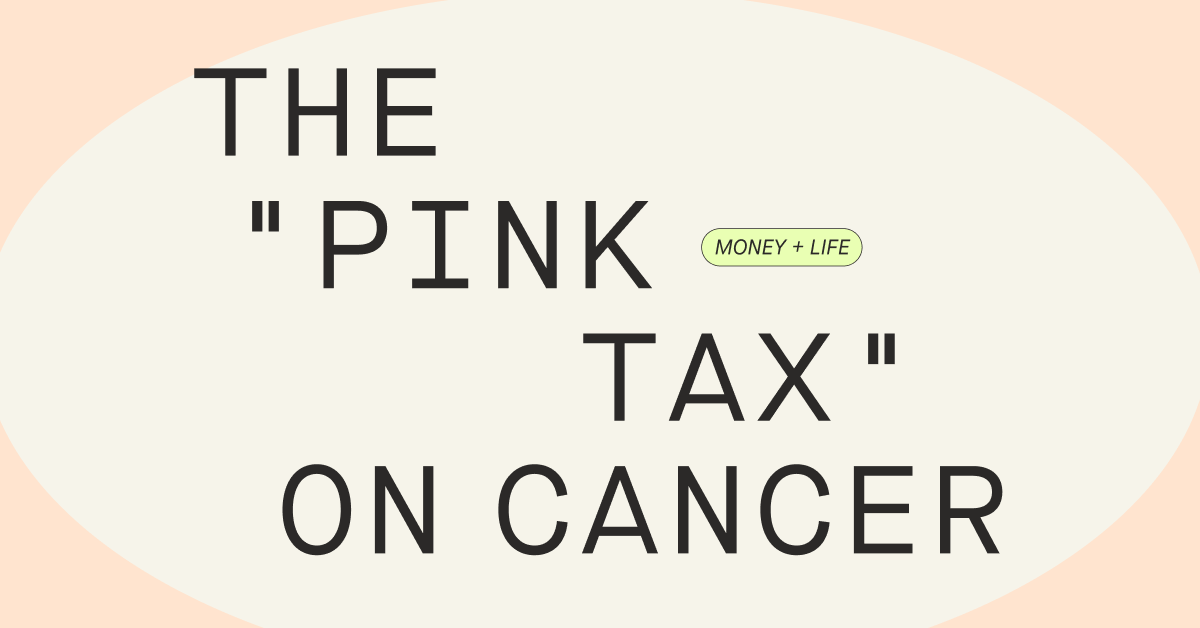Cancer has been in the headlines a lot lately. Last week, only days after 43-year-old actor Olivia Munn shared a moving Instagram post about her recent fight with breast cancer, Catherine, the 42-year old Princess of Wales, also went public with her own cancer diagnosis.
If these women seem too young to be talking about cancer, it’s because they are. But early-onset cancer diagnoses are becoming more and more common — especially for women. According to the American Cancer Society, in the US, a woman's likelihood of being diagnosed before the age of 50 is approximately 1 in 17, while a man's chance is approximately 1 in 29.

Yes, there’s even a gender gap in cancer rates. But that’s not the only gender disparity. Two new reports found that women pay a “pink tax” when it comes to health care. The first report, by Deloitte, found that women with employer insurance pay $15.4 billion more in out-of-pocket health care costs than men. On average, that’s about $266 more for each woman.
The second report, by the Susan G. Komen foundation, found that almost half of breast cancer patients (99% of whom are women) report that financial stress during cancer treatment affects the choices they make about their treatment, medications, and more.
This is what they call “financial toxicity” — or the negative impact that financial stress can have on a patient’s quality of life. At Ellevest, we found through our own research that financial health has a major impact on other aspects of women’s health. Ultimately, financial health is mental health is physical health. In fact, there are lessons that you can apply to both your financial health and fighting cancer.
No one is ever prepared for a cancer diagnosis — no matter what age, gender, or socioeconomic background you come from. But you can prepare yourself financially for a medical emergency to not only ease the financial burden for Future You, but to mitigate any stress you have now about the mere possibility of such an emergency.
Here are three things you can do this year to feel better prepared for whatever comes your way.
Keep a healthy emergency fund
At Ellevest, we typically recommend that you set aside three to six months’ worth of your take-home pay for emergencies. That may feel like a really big number for some people — and to others, it may not feel like a big enough cushion. How much you need depends on a lot of other factors — if you have a partner to support you, if you have dependents, or if you have a job with fantastic health leave policies, for example. (Btw, we have an Emergency Fund Calculator worksheet available to download for just this very thing, and it’s free for clients.)
Invest in cancer screenings
While cancer rates are rising, the cancer death rate is slowing down. That’s not only because we have new, groundbreaking cancer treatments — but also because of better early cancer detection technologies and protocols.
One of the best things you can do is invest your time and energy in annual screenings. Four of the cancers with rising rates — breast, prostate, colorectal, and cervical — have reliable screening tests for early detection. If you have health insurance, screenings are likely covered by your policy.
If you don’t have health insurance, you have options as well. The CDC’s National Breast and Cervical Cancer Early Detection Program (NBCCEDP) provides free screenings and diagnostic services to women who meet a need-based criteria. (They also have a program for colorectal cancer.) There are also some government programs that offer free screenings for breast and cervical cancer in states like California. Depending on where you live, your local Planned Parenthood may offer screenings for cervical cancer.
Understand your insurance policy (if you have one)
Health insurance in the US can be very confusing, expensive, and is often tied to employment, even though it shouldn’t be. If you have health insurance, understanding your policy is the first step to feeling confident about your coverage. Most policies cover genetic counseling or testing with low to no out-of-pocket costs. Take advantage of the coverage when you have it.
If your company provides an HSA, you can use that to cover many of the costs that your insurance may not cover — things like wigs, cabs to the hospital, child care, or extra supplements and medications. Disability coverage can be expensive, but if it’s something your employer provides, you may want to explore what that looks like for you.
Your health is more important than anything
Any dollar spent toward your physical or mental well-being is never a dollar wasted. Investing some time to figure out a budget that allows you to save for your emergency fund, get screened, or just get regular checkups is one of the most valuable things you can do for yourself.
And if you want some expert help setting your finances up for the possibility of an emergency, Ellevest’s all-women team of financial planners is uniquely equipped to guide you with empathy, compassion, and care. Book a complimentary 15-minute consultation here.
